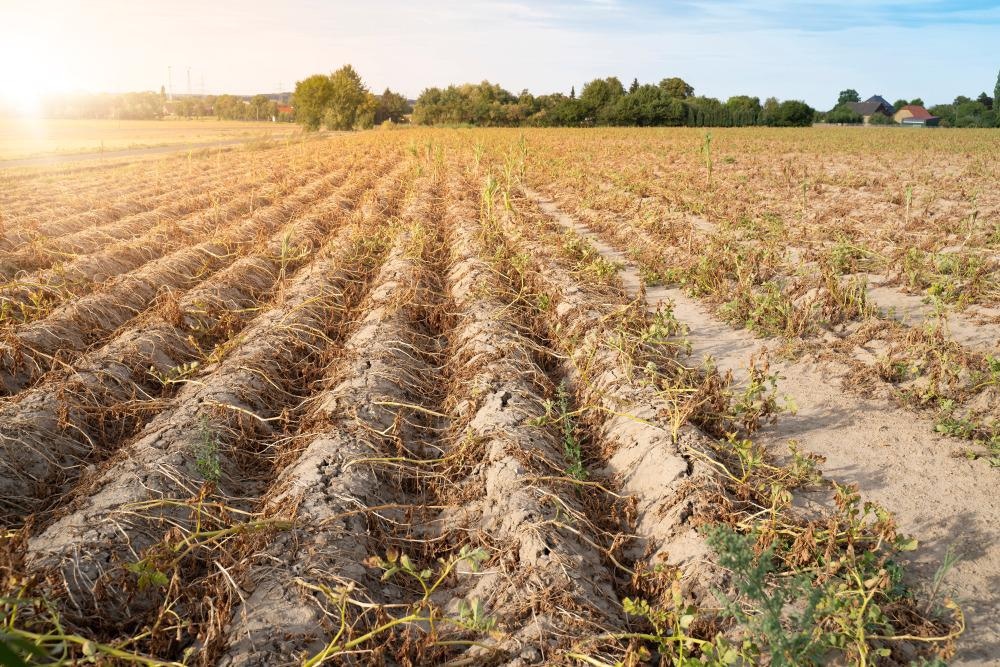May 12 2021
Severe weather conditions are affecting agriculture in the United Kingdom, but according to a new study, a majority of farmers are yet to prioritize the adaptability to the impacts of the climate emergency.

Image Credit: Tanja Esser/Shutterstock.com
According to all the farmers who participated in the study, they had witnessed or experienced problems caused by extreme weather, like prolonged dry spells or heavy in recent years, and anticipated these to increase further.
Several farmers were also concerned about the effect of drought and heat on the growth of grasses and crops, with knock-on impacts for winter animal feed and yield, and the implications of flooding and heavy rainfall for run-off and erosion of soil and for field operations, like harvesting and drilling.
But for many farmers, future and ongoing changes in the climate and weather were perceived as too long-term and too vague for them to invest a considerable amount of time or money in planning for these factors.
The new study revealed that a number of farmers are focused on business survival and short-term profitability in a difficult economic environment, and also concerned about other public and political pressures.
While there is an increasing acceptance that the climate is fluctuating and that there are advantages to take action, uncertainties about the exact speed, scale, speed, and nature of change at the local level make it hard for farmers to plan ahead.
 The study shows many farmers are focused on short-term profitability and business survival in a challenging economic environment, as well as concerned about other political and public pressures. Image Credit: University of Exeter.
The study shows many farmers are focused on short-term profitability and business survival in a challenging economic environment, as well as concerned about other political and public pressures. Image Credit: University of Exeter.
Published in the Climate Risk Management journal, the study was performed by Dr Rebecca Wheeler and Professor Matt Lobley from the Centre for Rural Policy Research at the University of Exeter, in association with researchers from the Centre for Ecology and Hydrology, Rothamsted Research, and Lancaster University.
Scientists performed 31comprehensive interviews, of which 15 were carried out with farmers and 16 with stakeholders such as industry representatives, consultants, and advisors.
According to several agricultural stakeholders, they were concerned about the fact that only a few farm businesses are taking adequate action to boost their business resilience to severe weather and climate change. While a few farmers “hadn’t got around” to specific measures they would like to undertake, others were “concentrating on the short term.”
Farmers have an array of challenges and uncertainties to cope with, and it is understandable they are focused on the short-term profitability and survival of their business. This seems to be preventing them from adapting to the effects of the climate emergency. It is essential the industry finds ways to build resilience, and that farm businesses are supported in planning and responding to changing weather patterns.
Dr Rebecca Wheeler, Centre for Rural Policy Research, University of Exeter
And more positively, the study also emphasized the capacity for adaptability and innovation within the farming sector. Within their business, several farmers are building resilience via actions to enhance soil health, which not only boosts productivity and stores carbon but also increases the potential for crops and grasses to deal with extreme weather conditions.
Farmers also have a reason to be optimistic about certain opportunities presented by climate change, like warmer temperatures, allowing new crops and better yields in certain cases, as long as they can “weather” the difficulties presented by negative effects.
In addition to enhancing soil health, positive actions adopted by farmers in the quest to future-proof their business included constant assessment of growing techniques and grass/crop varieties, boosting rainwater storage capacity, deploying more livestock housing with excellent ventilation, and risk-spreading by widening the diversity of their enterprises and crops.
There are many innovative and exciting activities happening on farms across the country, but much is still to be done to improve the resilience of individual farms and the industry as a whole.
Matt Lobley Professor, Centre for Rural Policy Research, University of Exeter
Professor Lobley continued, “Few farmers described themselves as directly adapting to climate change but most did see themselves as taking positive steps to respond to the risks of extreme weather or to generally improve their business resilience. For a number of farmers, this primarily took the form of improving soil health.”
While industry representatives who took part in the study welcomed these positive steps, they called for more uptake of these and other measures. The findings emphasized a need for agricultural and government stakeholders to work with farmers and thus help them interpret the risks posed to their specific business from severe weather and climate change.
Actions to assist farmers to adapt and respond to these risks include better industry collaboration, providing opportunities for farmer-to-farmer learning, and offering customized tools and support that consider the specificities of various farming systems.
The study was performed as part of the Crop Monitoring and Modelling Network for Improved Predictions of Climate Impacts (CROPNET) project, in association with the Centre for Ecology and Hydrology, Lancaster University, and Rothamsted Research.
The team is grateful to the Achieving Sustainable Agricultural Systems (ASSIST) network and all those who contributed to and participated in the research work.
The study was financially supported by the UK Climate Resilience program, which is jointly headed by UK Research and Innovation (UKRI) and the Met Office with Natural Environment Research Council (NERC) taking UKRI lead on behalf of Arts and Humanities Research Council (AHRC), Economic and Social Research Council (ESRC) and Engineering and Physical Sciences Research Council (EPSRC). Grant ref: NE/S01702X.
Journal Reference:
Wheeler, R & Lobley M (2021) Managing extreme weather and climate change in UK agriculture: Impacts, attitudes and action among farmers and stakeholders. Climate Risk Management. doi.org/10.1016/j.crm.2021.100313.